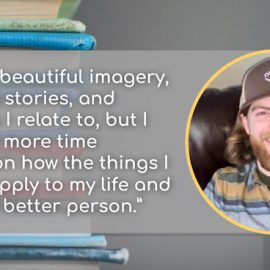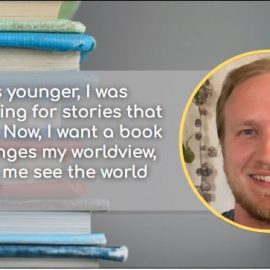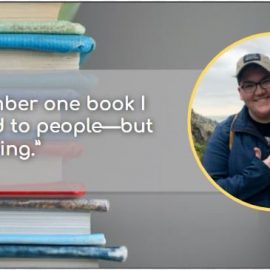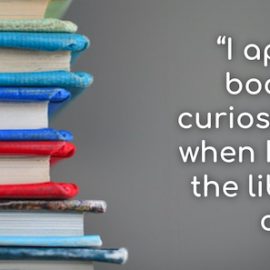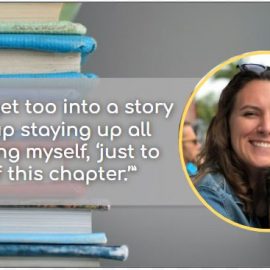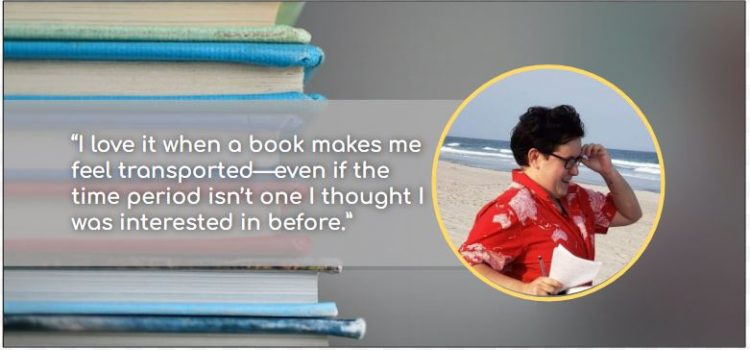
What book genre does Emory struggle to enjoy? How does Emory handle writing guides to books he disagrees with?
Emory is a Shortform guide writer from Maryland. He used to be a physical-copy-only person until he recently discovered the joy of audiobooks.
Our Interview With Emory
We recently interviewed Emory about his reading tastes and opinions. Here’s what he had to say.
What’s your favorite book and why?
I’m one of those annoying people who say, “Oh, it’s too hard to choose.” Plus, I find that my feelings about a particular book change a lot once I reread it. I will say that my favorite book from the last couple of years is Say Nothing by Patrick Radden Keefe. It was pitched to me as true crime, but it’s more like a history of the Provisional IRA, using a 1972 murder as a way to talk about the group’s tactics and the impact they had on their community. I thought it was really interesting and beautifully written to boot. Another book I liked a lot was Edinburgh by Alexander Chee.
What’s on your reading list these days?
I just finished My Year of Rest and Relaxation by Ottessa Moshfegh. I was a little disappointed by the ending, but it’s very funny—in a black comedy kind of way. The book is about a young woman trying to drug herself into being unconscious for a year—with her eccentric therapist and clingy friend alternatively helping and thwarting her. And, I’m actually planning to read another of Moshfegh’s novels next. Right now, I’m listening to some of Ian Fleming’s short stories on audiobook, since my roommate’s been showing me the James Bond movies for the first time. They’re not very good.
If you could have a dinner party with any three authors—dead or alive—who would they be and why?
Philip Roth and James Baldwin—who are obviously some of the greats—and Daniel Lavery, a humorist who’s also done some really great writing about trans issues in the last couple of years. All three of them are hilarious and say things about art and the writing process that I find really insightful.
What’s your favorite genre? Why does it intrigue you?
Historical fiction, which might be too broad a genre for me to really say it’s my favorite. Still, I love it when a book makes me feel transported—even if the time period isn’t one I was interested in before. Some of my favorite examples are The Poisonwood Bible, set in the 1960-70s Congo, and Tipping the Velvet, set in 1890s London.
Are there any book genres or tropes that you dislike or refuse to read?
A lot of my friends still love YA, but I stopped reading it when I stopped being a teenager and haven’t ever been able to get back into it. Sorry, Leigh Bardugo fans.
What’s your favorite way to read a book?
For a long time, I was a physical-copy-only person. But, in the last year, I’ve started listening to audiobooks, and I’ve been surprised by how much I like them. I feel like I barely have time to read for fun anymore, and listening to books in the car has helped a lot with that.
What’s your favorite quote from a book or an author?
In The Gulag Archipelago, Solzhenitsyn quotes a friend: “It is not enough to love mankind—you must be able to stand people.”
What are your favorite book adaptations and why?
I loved the movie Stardust as a kid, and I think it’s way more fun than the Neil Gaiman novella it’s based on.
Are there any lesser-known books that you’ve read that you want others to know exist?
I’m not super knowledgeable about queer romance, but I’ve read a few more recent novels, and Peter Darling by Austin Chant is probably one of my favorite books, period. Besides the romance—which is great!—it’s a reimagining of Peter Pan where Peter and Wendy are the same character—a trans boy who escapes to Neverland to try to live as himself.
At Shortform, how do you go about working on a book that has viewpoints you don’t agree with?
It depends on whether I think it’s just about a difference of opinion—in which case, it’s not my job to editorialize when writing a summary, and I try to remain objective—or actual disinformation, which would be irresponsible for me to summarize without caveats. I ran into the latter problem while writing a summary for Behold a Pale Horse by William Cooper. Cooper believes in some really out-there conspiracy theories—he directly inspired some episodes of The X-Files—and, while he’s totally earnest about what he’s saying, there’s usually no evidence for it. In addition, some of his ideas have antisemitic origins, e.g., the idea that the Illuminati run the world.
I got around this by stating what he thinks as objectively as I could in the summary, then using the commentary to point out contradictions, unsupported leaps of logic, and the bigotry behind some of what he says. At the same time, I didn’t want all of my commentary to be negative, so I also pointed out where his ideas were correct or close to reality—for example, his belief in “mind-control devices” sounds a lot less crazy to a reader once they know about CIA programs like MKUltra.
Emory’s Recommended Reading List
- Say Nothing by Patrick Radden Keefe
- Edinburgh by Alexander Chee
- The Poisonwood Bible by Barbara Kingsolver
- Tipping the Velvet by Sarah Waters
- Peter Darling by Austin Chant
About the Series
At Shortform, we want to give our employees names and faces so you can get to know the people who make the magic happen. That’s why we’re doing the Shortform Reads series, where we interview our employees and share their thoughts and opinions. You can check out more employee interviews here.

